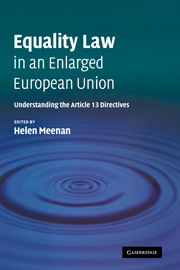Book contents
- Frontmatter
- Contents
- Preface
- Acknowledgements
- List of contributors
- Abbreviations
- Table of Cases
- PART I
- PART II
- 5 EU sex equality law post-Amsterdam
- 6 EU anti-racism policy; the leader of the pack?
- 7 Religion or belief; aiming at the right target?
- 8 Disability discrimination law in the European Union
- 9 Age discrimination – Of Cinderella and The Golden Bough
- 10 The ‘mainstreaming’ of sexual orientation into European equality law
- 11 Conclusion
- Index
6 - EU anti-racism policy; the leader of the pack?
Published online by Cambridge University Press: 22 August 2009
- Frontmatter
- Contents
- Preface
- Acknowledgements
- List of contributors
- Abbreviations
- Table of Cases
- PART I
- PART II
- 5 EU sex equality law post-Amsterdam
- 6 EU anti-racism policy; the leader of the pack?
- 7 Religion or belief; aiming at the right target?
- 8 Disability discrimination law in the European Union
- 9 Age discrimination – Of Cinderella and The Golden Bough
- 10 The ‘mainstreaming’ of sexual orientation into European equality law
- 11 Conclusion
- Index
Summary
Introduction
In November 2004, the former Directorate-General for Employment and Social Affairs became the Directorate-General for Employment, Social Affairs and Equal Opportunities. This change in nomenclature was accompanied by a refreshing of the Commission's Internet pages on anti-discrimination. In the transition to the new pages, the dedicated website on ‘anti-racism policy’ disappeared and was consigned to the archives section. This could be dismissed as a small matter of information presentation, but could it also be viewed as symptomatic of the current state of the Union's anti-racism policy?
The conventional view amongst many academic commentators is that race and ethnicity find themselves at the pinnacle of the so-called ‘hierarchy of equality’. The main reason for this perception is the relative strength of the Race Equality Directive when compared to other areas of EU anti-discrimination law. Notably, the prohibition of discrimination on grounds of racial or ethnic origin applies to a wider range of areas than equivalent legislation on discrimination on grounds of sex, religion or belief, disability, age and sexual orientation. Given such disparities within EU anti-discrimination legislation, there are good reasons to argue that a higher level of protection exists in respect of discrimination on grounds of racial or ethnic origin. Nevertheless, does this fully reflect the strength of the Union's commitment to combating racism? This chapter asks whether the picture painted by an exclusive focus on anti-discrimination legislation may be misleading.
- Type
- Chapter
- Information
- Equality Law in an Enlarged European UnionUnderstanding the Article 13 Directives, pp. 178 - 201Publisher: Cambridge University PressPrint publication year: 2007
- 2
- Cited by



